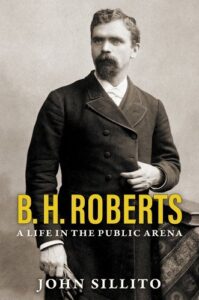 Title: B. H. Roberts: A Life in the Public Arena
Title: B. H. Roberts: A Life in the Public Arena
Author: John Sillito
Publisher: Signature Books, Salt Lake City
Genre: Biography
Year Published: 2021
Number of Pages: 585
Reviewed by Chad Curtis
I remember becoming aware of B. H. Roberts when I was a student at the University of Utah. I believe there was a display at the library about a special collection of his collected works. I checked out a book from the library too, I can’t remember the specifics, but I remember learning that here was a general authority who had some nuanced takes on the historicity of the Book of Mormon. That seemed way outside of my experience with church leaders, and I remember experiencing a bit of dissonance. I’m glad to learn a bit more of the life of this important figure in church history that perhaps most members aren’t aware of.
B. H. Roberts is a very flawed character, but in many ways it is refreshing. He’s honest, and he is willing to express his true views, even though he is a general authority. It certainly got him into trouble at times– I believe it even featured in a recent general conference address? Stilitto includes this reflection at the end: “In a church that values obedience and conformity, a man who was rebuked by church leaders for his obstinacy more than once remains respected and admired.” Some surprising things you may find out about him. Roberts supported the priesthood ban, in fact was one of its most vehement supporters. He was a democrat and a union man, and stood up for workers rights. He opposed giving women the right to vote. He at times struggled with alcoholism. He broached uncomfortable church topics, such as the historicity of the Book of Mormon and the flaws of Joseph Smith. He often got into conflicts with church leaders. He was a polygamist. He was elected to Congress, but then denied his seat due to his plural marriages. He had in some ways tortured family life, as he was closer to his third wife than his first two.
Despite his flaws, Roberts is a microcosm of Mormonism. Historically he sits in as a bridge between Mormonism’s roots and modernity. The book points out he lived through the Civil War while living to see automobiles and radio. He provides a focal point to reflect on the complexities within Mormonism, and I feel enriched reading about his example of faith.
The book is up front that there were source documents that were not available, and thus is book about the public, not the private, life of B. H. Roberts. I did find myself wanting to know more about his family life, as that seemed a big whole in the picture. I know that polygamous life– pre- and post-manifesto– must have been very challenging, and the apparent favoritism that comes through the biography seems very painful. I would have liked to hear from Margaret, Celia, and Sarah in their own words a lot more.
Overall a very good read.
